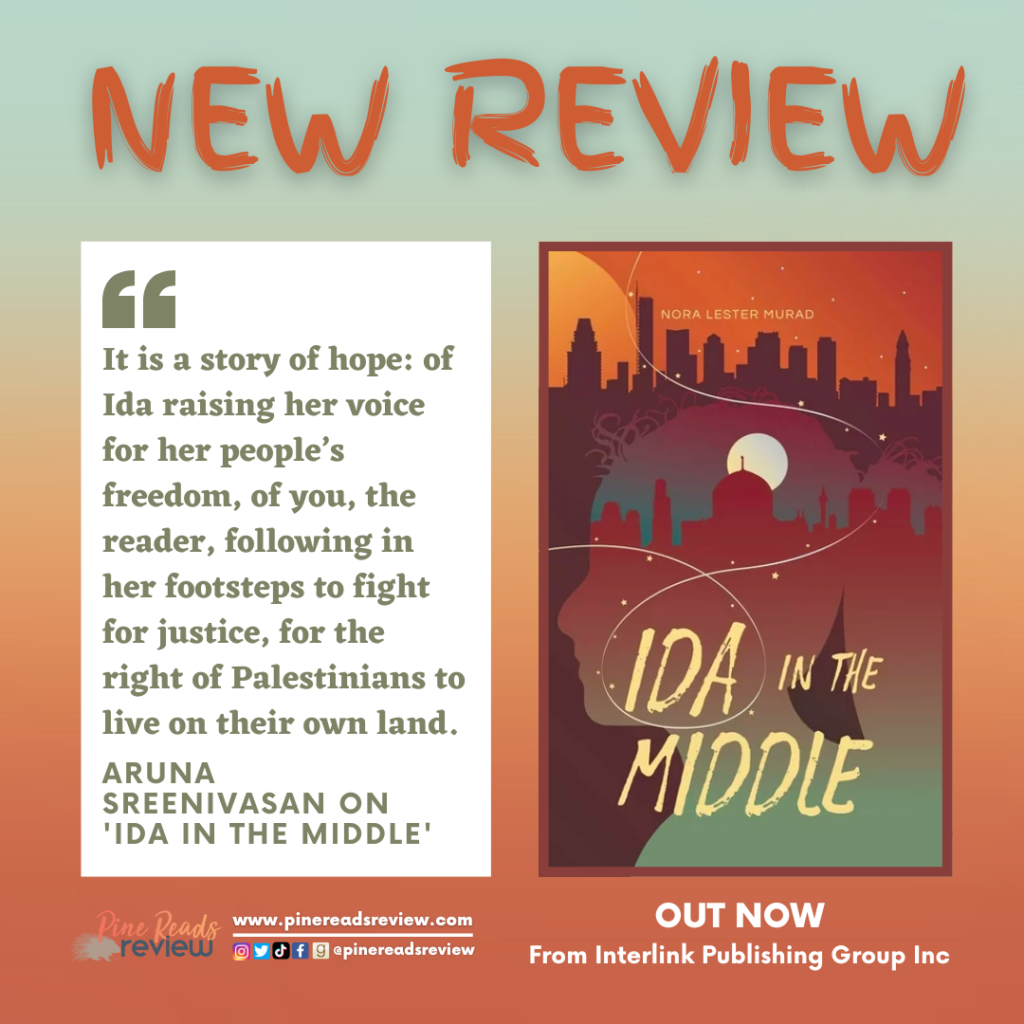
Ida in the Middle by Nora Lester Murad
Out now from Crocodile Books; 224 pages
Content Warning: Racism, Islamophobia, settler-colonialism, war themes, death of a family member, discussions of death, gun violence, hunger, destruction of ancestral land
About the Author: “Nora Lester Murad moved to Jerusalem in 2004 with her Palestinian husband and three Palestinian-American daughters. She co-founded Palestine’s first community foundation, Dalia Association, and Aid Watch Palestine, a community-driven aid accountability initiative. Nora has published in The Guardian, Aljazeera, Huffington Post, Open Democracy, and more. She speaks at international events around the world.
Rest in My Shade, co-authored with Danna Masad, [has been] released by Interlink in November 2018. An anthology of reflections by foreigners who have been transformed by Palestine is currently being shopped to agents. Nora is also finalizing two novels―one is women’s literary fiction and the other is aimed at upper middle grade.
Nora blogs at https://www.noralestermurad.com” (Bio from author’s Goodreads).
Find Nora Lester Murad on the following platforms:
Certain sentiments reflected in this interview are the author’s own and do not necessarily represent those of Pine Reads Review as a whole.
Ida has too many problems. The deadline of her final project presentation (which she has to give in front of the entire school!) is rapidly approaching, but she hasn’t touched it yet. Her classmates think that she’s a terrorist just because she’s Palestinian and Muslim. Her parents won’t tell her much about why they immigrated to the United States. And strangest of all: every time she bites into her late aunt’s green olives, she is transported between life in the US and an alternate reality in her parents’ village in Palestine. Life in Palestine comes with its own set of difficulties, but for the first time, she feels like she truly belongs somewhere, on this land where generations of her family have lived. Ida is content in this other life until she learns of plans of Israeli bulldozers coming to knock down yet another house in the village. With problems popping up wherever she goes, Ida wonders if she can face her fears and make a difference in both of her homes.
Geared towards middle schoolers, but perfect for readers of all ages—especially for anyone who is new to Palestinian history—Ida in the Middle blends historical fiction with a dash of magical realism that doesn’t take away from the gravity of the book’s themes. Ida is an easily lovable main character, and her initial struggles with fitting in at school, finding her passion, and anxiety with public speaking sets the scene for a promising coming-of-age story. Not only does she have to grapple with school and growing up, but she finds herself transported to Palestine via magical green olive, where she faces the realities of living under Israeli settler-colonialism. Murad draws from the last 80 years of Palestinian history and important current events as she describes Ida’s alternate reality: a friend’s house is about to be knocked down, another friend struggles to receive medical care, and she and her aunt are harassed at a checkpoint in West Jerusalem. Despite this brutal occupation, Palestine is where Ida finds her voice and discovers how much good can come of a single brave action. She takes her newfound knowledge of her family’s (and Palestine’s) history back to the States, where discussions with friends, family, and teachers cultivate her newly discovered passion: the Palestinian fight for liberation. Ida’s journey to find the bravery to speak up is an ode to how knowledge brings confidence and passion, how food keeps a culture alive and fans the flames of solidarity, and how oppression can never fully dismantle the strength of a united community. Ida in the Middle refuses to be a passive, demoralized story that quietly shuffles Palestine off into the history books; rather, the book is a defiant reverence of Palestine as a country that very much still exists. It is a story of hope: of Ida raising her voice for her people’s freedom, of you, the reader, following in her footsteps to fight for justice, for the right of Palestinians to live on their own land.
Aruna Sreenivasan, Pine Reads Review Assistant Director